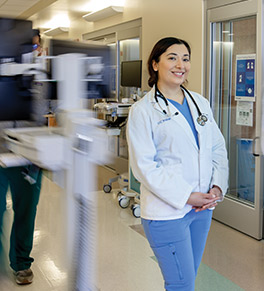Learning medicine on the front lines of COVID-19

"It was a roller-coaster ride with every patient," medical student Violeta Osegueda recalls. "I would obsess over chest X-rays, hoping my readings of even the smallest improvements were accurate." Photo by Michael Neveux for UCI Health
Growing up in the San Fernando Valley with parents who immigrated from Mexico and El Salvador, Violeta Osegueda dreamed of becoming a doctor. When her father died suddenly at age 50 from complications of diabetes, she questioned her career choice and put her education on hold.
Today, Osegueda is preparing to begin her final year at the UCI School of Medicine. She’s also a medical advocate for the Spanish-speaking community, conducting language outreach through a website she launched, writing opinion pieces and joining in educational programs.
During the winter coronavirus surge, she worked with severely ill COVID-19 patients in UCI Medical Center’s intensive care unit (ICU). The experience took a heavy emotional toll, but it deepened her resolve to get accurate medical information to Southern California’s Latino community.
Osegueda recounts that harrowing time for Live Well:
I spent January 2021 in a four-week rotation in the medical ICU. We were swamped with patients, placing great stress on the staff even with residents volunteering. Our patient count doubled, nearly all of them COVID-19 patients in severe respiratory distress. Most were Latinos.
I’d only had my first dose of the vaccine, so I entered every COVID-19 room wearing my N95 mask, face shield, gown and gloves. I got to know my patients when they could still speak. I updated their families every evening by phone because they weren’t allowed to visit unless the patient was nearing death.
It was a roller-coaster ride with every patient. I would obsess over chest X-rays, hoping my readings of even the smallest improvements were accurate. They rarely were.
I had a lot of hope for one patient in particular. He was able to flip himself onto his stomach without help, a position that makes breathing easier for our COVID-19 patients. He was working so hard to stay alive.
One morning, he was struggling to breathe and needed to be intubated right away. The resident and I held his hand during the procedure. I told him I would see him soon, in Spanish.
Later he began suffering multi-organ failure and was placed on comfort care. I cried in the workroom when I heard the news. The next day, he passed away.
I saw one of my attending physicians break down after another patient got sicker. As Latinas, she and I felt these losses deeply, and it was validating to see that at her professional level, expressing grief was normal.
Fortunately, I’m able to share these experiences with my roommates, fellow medical students and advocates for the Latino community.
Last May, I started medicalspanish.org, to make free, online Spanish-language resources and current COVID-19 information from the Centers for Disease Control and Prevention available. Now I want to address vaccine hesitancy and unequal vaccine distribution. I’m grateful to be a part of these efforts because I have a lifetime of experiences that I’m finally able to share.
— Violeta Osegueda
Learn more about medical education at the UCI School of Medicine.




